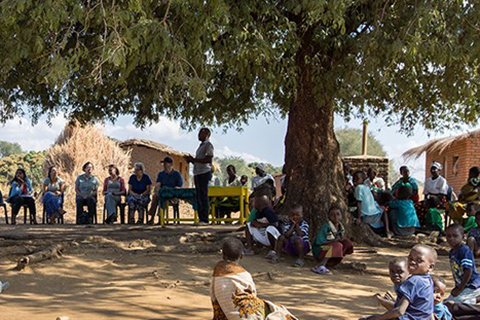Tackling global food security

CSE students join Land O’Lakes, Inc. to help solve the global food crisis
The global population is estimated to reach 9 billion people by 2050, and feeding them all is not going to be easy.To help address this problem, Land O’Lakes, Inc. created the Global Food Challenge. Over the next year, 10 sophomores, hand-picked from five leading universities will identify innovative and practical ways to meet the world’s rapidly growing food needs.
Of these 10 students, three are from the University of Minnesota, and two are in the University’s College of Science and Engineering—Elizabeth Alonzi is a bioproducts and biosystems engineering student and Blake Schweiner is studying chemical engineering and chemistry.
For Alonzi, the opportunity to work on a project involving sustainability and food supply appealed to her as it complimented her major.
“My major is a lot about sustainability with food systems and environmental systems. I thought [the Global Food Challenge] sounded really cool, and I’ve always wanted to do something more meaningful,” Alonzi said.
Schweiner was looking for an experience in which he could network. “I loved the opportunities along with [the internship]—to travel and meet with people all around the nation and to make a difference. I was really looking to make a difference in what I did,” Schweiner said.
Global Food Challenge emerging leaders have a dynamic experience throughout the school year. They conduct research with faculty at their respective institutions, meet with Land O’Lakes executives, and receive perks such as media training. Then, during an 11-week paid summer internship at Land O’Lakes, Inc., they travel to Africa.
Schweiner is anxiously awaiting the trip to Africa. “I can’t wait to go to Africa and get a first-hand view of what people are facing. In order to get a solution I think we need to be there and see things we don’t think about,” he said.
CSE student Jonathon Sabel was one of the 10 emerging leaders for the 2014-15 challenge. While in Africa, he was able to meet with farming communities, international development organizations and government officials. They exchanged ideas, learned about local practices and framed new opportunities in international agriculture.
“It's a great program. I had a wonderful time learning, from a range of perspectives, about the challenging issues within food security,” Sabel said.
University of Minnesota College of Science and Engineering Assistant Dean Susan Kubitschek is the University of Minnesota liaison for the program and traveled to Africa with Sabel and the rest of the team.
“The Global Food Challenge gives students a unique opportunity to work as ‘Emerging Leaders’ and take part in an incredible year long experience outside the classroom,” Kubitschek said. “They are challenged to be a part of the solution, join the conversation, and help ensure food security for all.”
The University of Minnesota has stated its commitment to addressing several grand challenges, one of them includes feeding the world sustainably. The Land O’Lakes Global Food Challenge is one way the University can team up with industry to tackle the challenge. This partnership also gives rising student leaders a unique, hands-on opportunity to begin solving the problem of food security, so in 2050 they can see how they contributed to feeding the world’s population.
